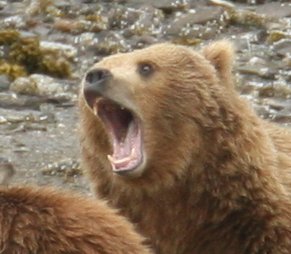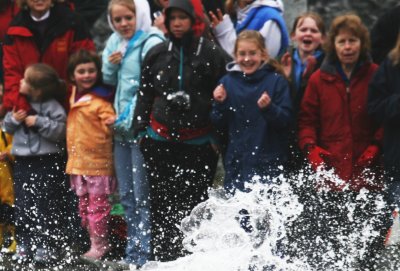
 Share This Page
Share This Page| Home | | Sailing | | Alaska 2007 | |  |  Share This Page Share This Page |

Copyright © 2007, P. Lutus. All rights reserved. Message Page
(double-click any word to see its definition)

It's time for me to confess — my life is not a controlled experience, a guided tour. I was dramatically reminded of this when my boat crashed into a sharp submerged rock this season, in a very wild place, surrounded by very large bears. My boat didn't sink and I didn't get eaten, but only by the smallest of margins, the thinnest layer of fiberglass (read the details of this misadventure here).
I was making my way into Kaflia Bay, near where Timothy Treadwell and Annie Huguenard were eaten by bears in 2003. The entrance is shallow and the currents are sometimes strong. The current drew me onto a rock, a so-called "pinnacle" that stands almost vertically from the bottom, and the rock dented my boat's hull.
But the dent didn't breach my hull, the water didn't flow in, and I didn't have to wade ashore to face the bears, some of whom probably knew Treadwell personally (and maybe helped eat him).
On hearing an account like this, some of my readers may wonder why I don't just stay home and watch life on the Discovery Channel. I have to say I regard that as much riskier than what I do, apart from being fairly definable as a "non-life activity."
This year, 2007, marks my 20th anniversary as a sailor. I bought my first boat in 1987 and began to sail it around the world the following year. Right now I'm thinking of all the things I've hit with boats over the years.
As just one example, I hit a whale one night, while both he and I were sleeping, in the middle of the Indian Ocean. My boat was moving briskly along, near the equator, between Australia and Sri Lanka, when it struck a whale who was sleeping near the surface. I had never felt the boat move quite that way before — a kind of organic thump, easily distinguished from a rock or a log. I awoke and went topside just in time to see a whale sounding. As he disappeared beneath the waves, I yelled out, "Sorry!"
Isn't talking to a whale a bit weird? Doesn't that mark you as one of those people who marches through life muttering to himself? Well, not really, or not necessarily. This season in Alaska I met a pod of dolphins who related to me directly — not just my boat, but me. If I moved from one side of the boat to the other with my camera, they changed sides and continued to show off, looking directly at me. Then, when I went inside the boat for a minute to change lenses, they realized they had lost their audience and swam away. I want to say I treasure each such encounter with another species, and over twenty years' sailing I've had plenty of them.
In that connection, because of years of wilderness adventure, I am coming to realize the weirdest species is ... us. One need only spend time with various animal species to gradually realize how twisted most people are. There is something about how we are educated that makes us feel we've been cheated, wronged, and deserving of more from nature than we've gotten already.
The primary way we build a sense of injustice and outrage is by replacing everyday reality with one or another imaginary alternative — a religious belief, a political program, whatever — some idealized world that everyone has to feel guilty for not having lived up to. This is a rather complicated subject that touches on a psychological condition called "narcissism," among many other things, but the end result is a real tragedy — meeting young people whose sense of wonder has been permanently extinguished.
It would be a mistake to attribute to animals a greater measure of wisdom than people have, but on the other hand, animals don't have to be smarter than us to escape some of our more laughable distortions of reality — they only have to be denied the blessings of language.

Without language (at least as we understand that term), animals can't easily be kept from regarding life as a wonderful thing, as they find it, in and of itself. Each of us, at one time or another, held that view, however briefly, before we learned how lame it is to take joy in everyday experience. I mean, how shallow, how primitive, to take simple joy in a wildflower, when we could instead complain that we were denied our birthright — that is to say, our own personal iPhone, if only we had gotten to the store before they ran out. Outrageous, unjust, wrong!
This next part is likely to offend some readers, but it can't be helped. Religion and its modern equivalents are primarily responsible for extinguishing a sense of wonder at life and gratitude for it, replacing it with a profound sense that the world would be a better place if only our ideal program could be imposed on reality.
Someone will doubtless write me and object that it is consumerism, not religion, that poses the biggest obstacle to an accurate perception of reality in modern times. But consumerism is religion. It has all the classic properties of a religion — you aren't good enough the way you are, the world is innately unsatisfactory as it is, but you can buy your way to a proper relationship with reality.
In point of fact, you can't do this. All money can buy you is a closer association with mass illusion (that's not all that money can do, but we're talking about the common, naïve perception of money). The universe is morally neutral, nature doesn't care about you, so ... you need to learn how to care about yourself. Start by no longer dismissing ordinary experience as beneath you.
Some readers will surely object that this leaves us with an infantile, unsophisticated joy at existence, and nothing else. Guess what, boys and girls? That's all we've ever had. Let's not give it away.
This may come as a shock to some, but one of the few things we can be reasonably certain about is that nature intends each of us to develop as individuals, to express our unique, individual traits, our genetic makeup, on the world. That is the real meaning of evolution, a scientific theory with excellent evidentiary support. Joining mass movements, becoming a ditto-head, is not the true meaning of life. And it is much easier to say what the meaning of life is not, than what it is.
Life is not about which clique you join, or what gadgets you manage to acquire (another way of saying the same thing). Life is not about belonging. One of the things life is about is ... you. I can say this with certainty, even though chances are I have not met you. Your responsibility to the world is to experience it directly, as an educated individual, someone able to choose among alternatives based on evidence.
You were born a separate person, and that happened for a reason. You are meant to have separate experiences.
I hope you enjoy this article set.| Home | | Sailing | | Alaska 2007 | |  |  Share This Page Share This Page |